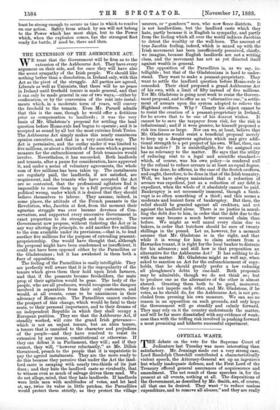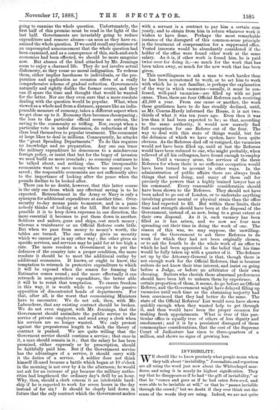OFFICIAL WASTE.
Tildebate on the vote for the Supreme Court of udicature last Tuesday was more interesting than satisfactory. Mr. Jennings made out a very strong case, Lord Randolph Churchill contributed a characteristically violent speech, the Attorney-General set up an ingenious but wholly inadequate defence, and the First Lord of the Treasury offered general assurances of acquiescence and amendment. The net result of these speeches is, for the present at all events, nothing at all. The dispositions of the Government, as described by Mr. Smith, are, of course, all that can be desired. They want "to reduce useless expenditure, and to remove all abuses," and they are really going to examine the whole question. Unfortunately, the first half of this promise must be read in the light of the last half. Governments are invariably going to reduce expenditure and remove abuses—as soon as they have ex- amined the whole question. If we could recall any instance of an unprompted announcement that the whole question had been examined, and as a consequence of this, such-and-such economies had been effected, we should be more sanguine now. But abuses of the kind attacked by Mr. Jennings seem to enjoy a charmed life. They do not involve actual dishonesty, so they rouse no moral indignation. To redress them, either implies harshness to individuals, or the pre- paration and application as occasion offers of a really comprehensive scheme of gradual reduction. Governments naturally and rightly dislike the former course, and they can ill spare the time and thought that would be wanted for the latter. Nor are they even sure that a more resolute dealing with the question would be popular. What, when viewed as a whole and from a distance, appears like an indis- pensable measure of economy, takes a different aspect when we get close up to it. Economy then becomes cheeseparing ; the loss to the particular official seems so serious, the saving to the community so trifling. Nor, except when a particular vote is under discussion, do reductions of this class lend themselves to popular treatment. The economist at large likes to deal in millions. Consequently, he attacks the "great Spending Departments." To do this requires no knowledge and no preparation. Any one can trace the military expenditure he denounces to a mischievous foreign policy, or insist that but for the bogey of invasion we need build no more ironclads ; so economy continues to be talked about, and nothing else. The irresponsible economists want to save money where no money can be saved ; the responsible economists are not sufficiently alive to the importance of looking after the pence when the pounds decline to be looked after.
There can be no doubt, however, that this latter course is the only one from which any effectual saving is to be expected. Retrenchment in the Army or Navy is only a synonym for additional expenditure at another time. Over- security to-day means panic to-morrow, and in a panic nobody thinks of looking at the bill. But the more im- possible it is to keep down expenses in one direction, the more essential it becomes to put them down in another. Soldiers and sailors, guns and ships, cost much money ; whereas a trainbearer or an Official Referee costs little. But when we pass from money to money's worth, the tables are turned. The one outlay gives us security which we cannot get in any other way ; the other gives us specific services, and services may be paid for at too high a rate. The more resolute a Government is to put the defences of the country into a proper condition, the more resolute it should be to meet the additior.al outlay by additional economies. It knows, or ought to know, the temptation to retrench in protective expenditure to which it will be exposed when the season for framing the Estimates comes round ; and the more effectually it can retrench in non-protective expenditure, the better able it will be to resist that temptation. To ensure freedom in this way, it is worth while to conquer the passive opposition of discontented heads of departments. For that, after all, is the worst that economising Ministers have to encounter. We do not ask, then, with Mr. Labouchere, that any existing contract should be broken. We do not even suggest, with Mr. Jennings, that the Government should assimilate the public service to the service of private employers, and send away a clerk when his services are no longer wanted. We only protest against the preposterous length to which the theory of contract is pushed. We are quite willing that the Goverment service should continue a service ; that once in it, a man should remain in it ; that the salary he has been promised, either expressly or by prescription, should be faithfully paid him. But if the Government service has the advantages of a service, it should carry with it the duties of a service. A soldier does not think himself ill-used because a battle which began at 10 o'clock in the morning is not over by 4 in the afternoon; he would not ask for an increase of pay because the military autho- rities had lengthened the ordinary day's drill by an hour. Why. then, should a clerk esteem it an intolerable hard- ship if he is expected to work for seven hours in the day instead of for six ? It should be clearly laid down in future that the only contract which the Government makes with a servant is a contract to pay him a certain sum yearly, and to obtain from him in return whatever work it wishes to have done. Perhaps the most remarkable instance of the disregard of this common-sense principle is the treatment of compensation for a suppressed office. Vested interests would be abundantly considered if the holder of the office were found other work at the same salary. As it is, if other work is found him, he is paid twice over for doing it,—so much for the work that has been taken away, so much for the new work that has been given.
This unwillingness to ask a man to work harder than he has been accustomed to work, or to set him to work with which he is not familiar, is perhaps the explanation of the way in which vacancies—usually, it must be con- fessed, well-paid vacancies—are filled up with no just cause. Thus, there are four Official Referees each receiving £1,500 a year. From one cause or another, the work these gentlemen have to do has steadily declined, until, as Mr. Cozens-Hardy informed the House, it is not two- thirds of what it was ten years ago. Even then it was less than it had been expected to be ; so that, according to the same authority, it would now scarcely find full occupation for one Referee out of the four. The way to deal with this state of things would, but for the delusion of which we have spoken, have been quite obvious. As the Referees died off or resigned, the vacancies would not have been filled up, until at last the Referees would have been reduced to one, who might probably, when relieved of all his colleagues, have found enough to employ him. Until a vacancy arose, the services of the three Referees for whom there is no sufficient occupation would have been turned to account in other ways. In the administration of public affairs there are always fresh things that need doing, and many of them call for precisely the powers that a highly trained lawyer has at his command. Every reasonable consideration should have been shown to the Referees. They should not have been asked to go out of London, or to undertake anything involving greater mental or physical strain than the office they had expected to fill. But within these limits, their time and strength should have been at the disposal of the Government, instead of, as now, being to a great extent at their own disposal. As it is, each vacancy has been filled as it has arisen, and we now see four men spreading out their time in doing the work of one. The reason of this was, we may suppose, the unwilling- ness of the Government to ask three Referees to do work for which they had not been originally chosen, or to ask the fourth to do the whole work of an office to which he had been appointed in the belief that his time would be fully taken up with a quarter of it. The defence set up by the Attorney-General is that, though there is not enough work for the Official Referees, that is because suitors do not know their true interest, and insist on going before a. Judge, or before an arbitrator of their own choosing. Suitors who cherish these abnormal preferences should have been left to unlearn them by experience. A certain proportion of them, it seems, do go before an Official Referee, and the Government might have delayed filling up vacancies until such time as the abstaining majority had been convinced that they had better do the same. The state of the Official Referees' List would soon have shown quickly enough when they wanted help to get through it, and then would have been the proper occasion for making fresh appointments. What is true of this par- ticular office is equally true of others of less dignity and emolument; and it is by a persistent disregard of these commonplace considerations, that the cost of the Supreme Court of Judicature has risen to three-quarters of a million, and shows no signs of growing less.



















































 Previous page
Previous page